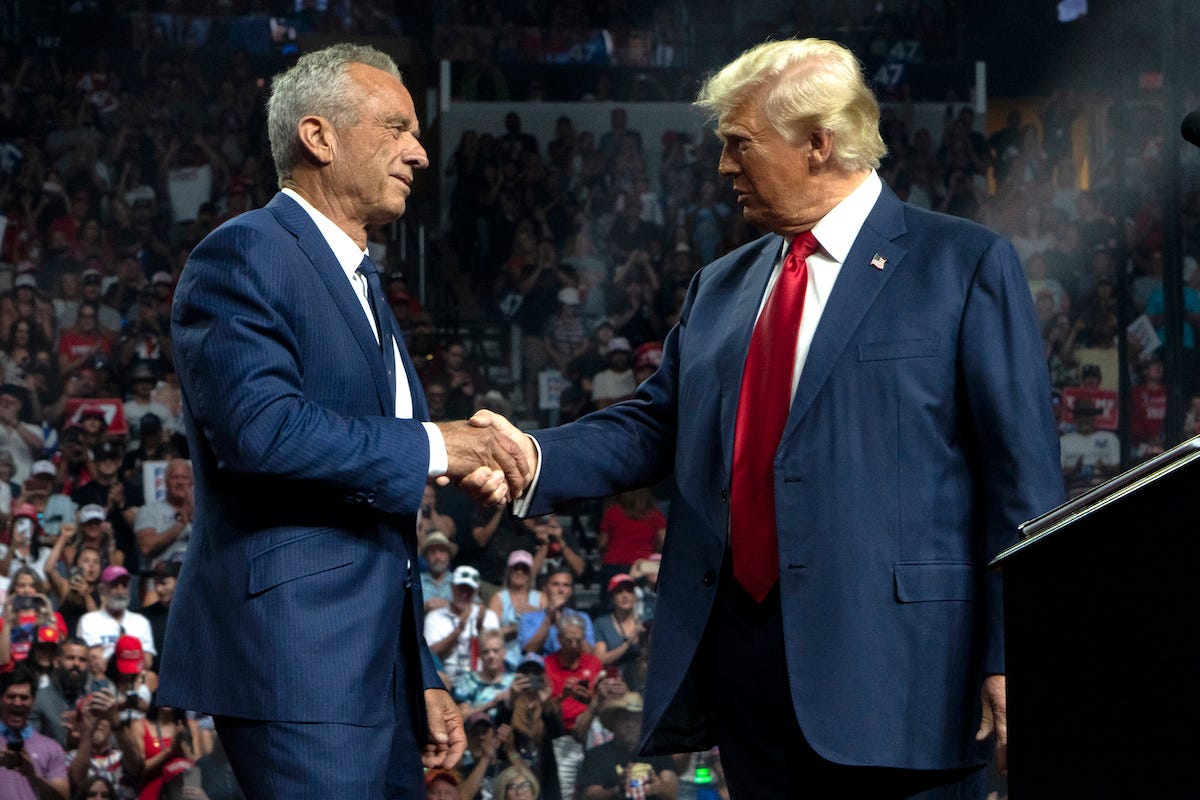More On Ethical Populism
The sweet spot lies in demagogic appeals that can withstand factual scrutiny.
The competition is stiff, but for me the most demoralizing spectacle from November 5 through the Nancy Pelosi-led whip operation to deny AOC Democrats’ top oversight role was the outpouring of feigned naïveté over Donald Trump’s nominee to head the Department of Health and Human Services.
Elected officials as senior as Gov. Jared Polis (D-CO) and Sens. Cory Booker (D-NJ) and Chris Coons (D-DE) all participated, singing Robert F. Kennedy, Jr.’s praises in different ways.
Democratic operators will pay no attention to their own track records, then chalk this up to savvy. Won’t Republicans be busted when Democrats extend the hand of cooperation to fulfill Trump’s least-noxious campaign promises, and it turns out he was lying? Isn’t it better for an unseasoned mediocrity like RFK Jr. to lead HHS than some cunning right-wing fanatic?
Well, RFK Jr. is a different kind of fanatic and his fixations make him just as destructive as an ideological conservative. But I mainly just think it’s better to deliver bad guys defeat after defeat—to let the aroma of failure envelop them—than to play a game of multi-dimensional chess that nobody watches until the end, when news headlines commemorate RFK Jr.’s successful confirmation. Checkmate, Republicans!
At the end of the day, I’d be surprised if any Democrats vote to confirm RFK Jr., but their misguided cunning has contributed to a situation where Kennedy’s likely to be confirmed anyhow, with Republican votes, because, at the moment, the public actually supports his nomination.
This would be a bad outcome for Americans and their health care, but also an injustice. It’s always an injustice when a con artist gets rewarded. And it’s regrettable that Democrats have increased the likelihood of that outcome in this case.
Part of the story here is that Democrats don’t really know how to oppose Republicans these days, except insofar as the stakes are tied to tax or health care policy. But in this case it should be quite simple: RFK Jr. is a charlatan; he preys on people, and has cost many of them their lives.
IN POLIO POSITION
That’s really the whole story. And it’s completely defensible.
RFK’s campaign against vaccines is charlatanism; the people he preys upon are families looking for villains to blame for their tragic circumstances, and the dead people are those (mostly children) who went unvaccinated because of his dishonest advocacy.
It’s demagogic in some sense to oppose RFK Jr. in harsh, emotionally evocative terms. We certainly feel aggrieved when Republicans deploy this kind of tactic against people who don’t deserve it. But in RFK Jr.’s case, it’s correct. And that’s a useful reminder for Democrats, who are frequently uncomfortable in the high-dudgeon register.
Democratic Party-aligned operatives have fortunately mounted a more concerted, outside campaign to defeat RFK Jr., but you can hear what I’m getting at in the tenor of their advocacy. Obviously they aren’t ignoring his crusade against vaccines, or the fact that he is at least indirectly responsible for a deadly measles outbreak in Samoa. But the fact that this makes him a degenerate—a bad person who should be a pariah among decent people—falls out of the critique in favor of a credential-based argument: that it’s dangerous to place an amateur in charge of a huge, economically significant organization.
“When [voters] learn his actual positions, they really move on him. So we just have to inform the public, inform the Senate, and let people know what his positions are and how dangerous they are,” Anne Shoup, the director of Protect Your Care, told the New Republic’s Greg Sargent. “He’s opposed to life-saving vaccines. He’s pledged to stop funding for treatments and cures for deadly diseases. Let’s also not lose sight of the fact that he’s never run any major organization. He’s never run an organization. The idea that he has the experience and skills to run a major health care program like Medicare or Medicaid, or that he can run a huge Department of Health and Human Services that oversees healthcare for 125 million people, that oversees the health care system that makes up 17 percent of our economy is absurd. It’s quite literally life and death for people.”
I don’t meant to dismiss this as wrong-headed or suggest it has no role in an anti-RFK Jr. campaign. Different people will be persuaded by different arguments. And of course it is true that RFK Jr. isn’t qualified to run HHS, just as most of Trump’s nominees aren’t qualified for their jobs, and Trump himself is both unqualified and unfit and should be legally barred from his.
My point is really that it shouldn’t overpower or come at the expense of a demagogic, disgust-based appeal—a story about how RFK Jr. has gained fame and wealth on the basis of deadly scams. This is really not about credentialing or the specialness of scientific consensus; RFK Jr. could have an honors degree from the best medical school, real executive experience, and a wormless brain, and it’d still be an outrage for him to become HHS secretary.
He shouldn’t be HHS secretary because he’s a charlatan who preys on people and doesn’t care if they die.
POP GOES THE MEASLES
This is a general weakness. When Democrats experiment with populism they tend to become hobbled either by their own meritocratic biases, or by bloodless, poll-tested language, or by a category error: that economic populism is synonymous with transforming the U.S. into a Nordic-style social-democratic state.
They are also, understandably but excessively, wary of demagoguery, which they associate with Donald Trump and his deep rot of bad faith. There is a real conundrum here. Demagoguery and populism, without moral ballast and good mental habits, will quickly drift in ugly directions: deception, incitement, scapegoating.
But I believe it’s possible—in a society that remains unjust, and a political system bursting with corruption—to mount an ethical populism and ride it to political power.


